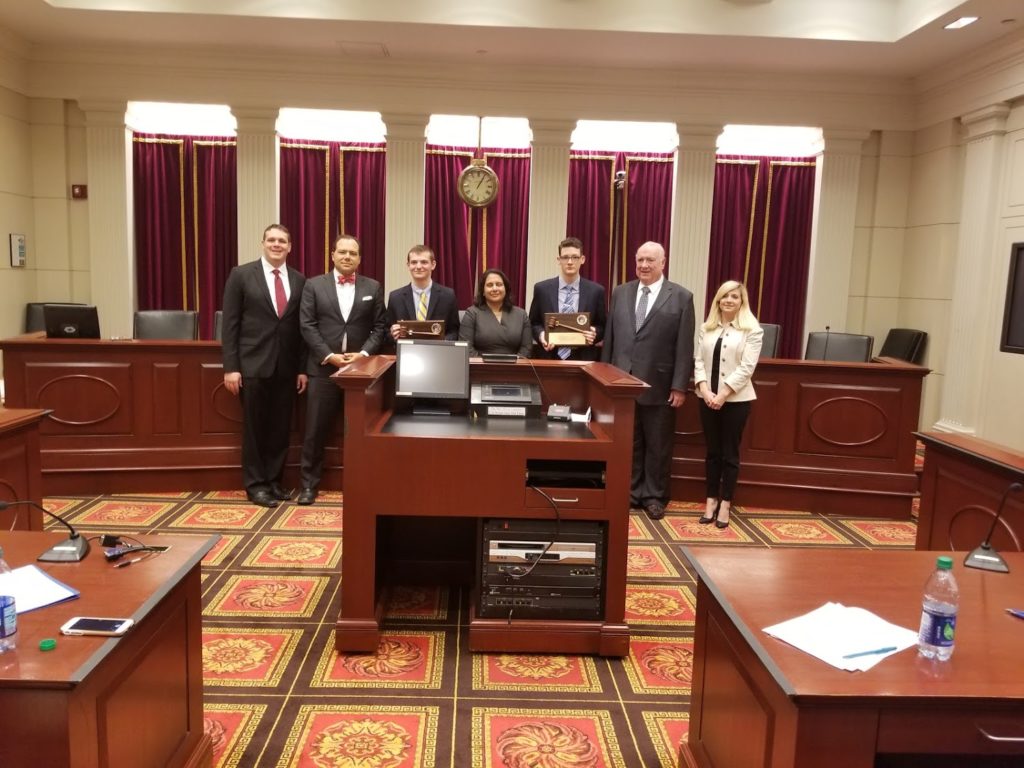The 2020 Harlan Institute-Ashbrook Virtual Supreme Court Semifinal Rounds
April 12, 2021Match #1
Petitioner: Team 8006
|
Respondent: Team 7860
|
Match #2
Petitioner: Team 7872
|
Respondent: Team 7852
|
Petitioner: Team 8006
|
Respondent: Team 7860
|
Petitioner: Team 7872
|
Respondent: Team 7852
|
In October, the Harlan Institute and Ashbrook announced the Eighth Annual Virtual Supreme Court Competition. This competition offers teams of two high school students the opportunity to research cutting-edge constitutional law, write persuasive appellate briefs, argue against other students through video chats, and try to persuade a panel of esteemed attorneys during oral argument that their side is correct. This year the competition focuses on Torres v. Madrid.
We are proud to announce the top 12 respondent teams that will advance to the next round. Here are their preliminary oral argument videos, and their briefs. We announced the top 12 petitioner teams here.
 The Harlan Institute and Ashbrook announce the Eighth Annual Virtual Supreme Court Competition. This competition offers teams of two high school students the opportunity to research cutting-edge constitutional law, write persuasive appellate briefs, argue against other students through video chats, and try to persuade a panel of esteemed attorneys during oral argument that their side is correct. This year the competition focuses on Torres v. Madrid.
The Harlan Institute and Ashbrook announce the Eighth Annual Virtual Supreme Court Competition. This competition offers teams of two high school students the opportunity to research cutting-edge constitutional law, write persuasive appellate briefs, argue against other students through video chats, and try to persuade a panel of esteemed attorneys during oral argument that their side is correct. This year the competition focuses on Torres v. Madrid.
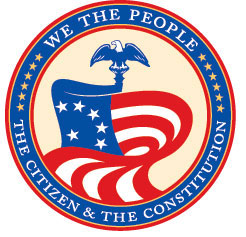 The competition is endorsed by the Center for Civic Education's We The People Competition:
The competition is endorsed by the Center for Civic Education's We The People Competition:
"The Center for Civic Education is excited to endorse the Virtual Supreme Court Competition. The Competition is relevant for high school students studying the Constitution and Bill of Rights." -Robert Leming, Director, We the People Programs, Center for Civic Education
Resolved:
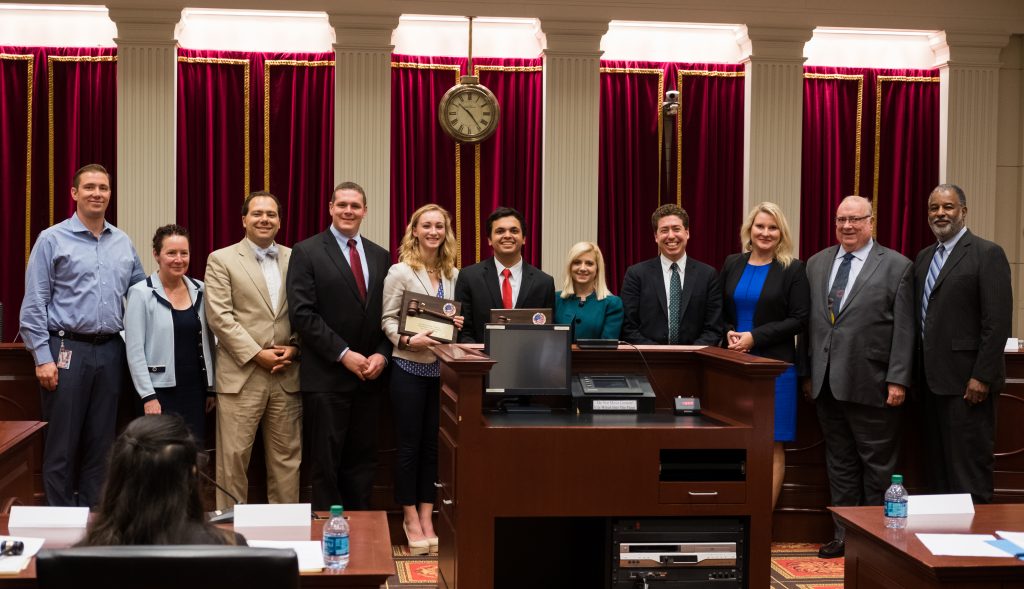
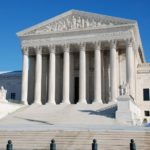 Grand Prize - The Solicitors General of FantasySCOTUS
Grand Prize - The Solicitors General of FantasySCOTUSThe members of top Petitioner and Respondent teams will be invited to attend the Ashbrook Academy on the Supreme Court and the Constitution in June 2021. Ashbrook will cover reasonable travel costs to the academy. Members of the winning team will each receive a $500 Amazon gift card. Members of the runner-up team will each receive a $250 Amazon.com gift card.
Members of the sixteen semifinalist teams will each receive a $25 Amazon.com gift card.
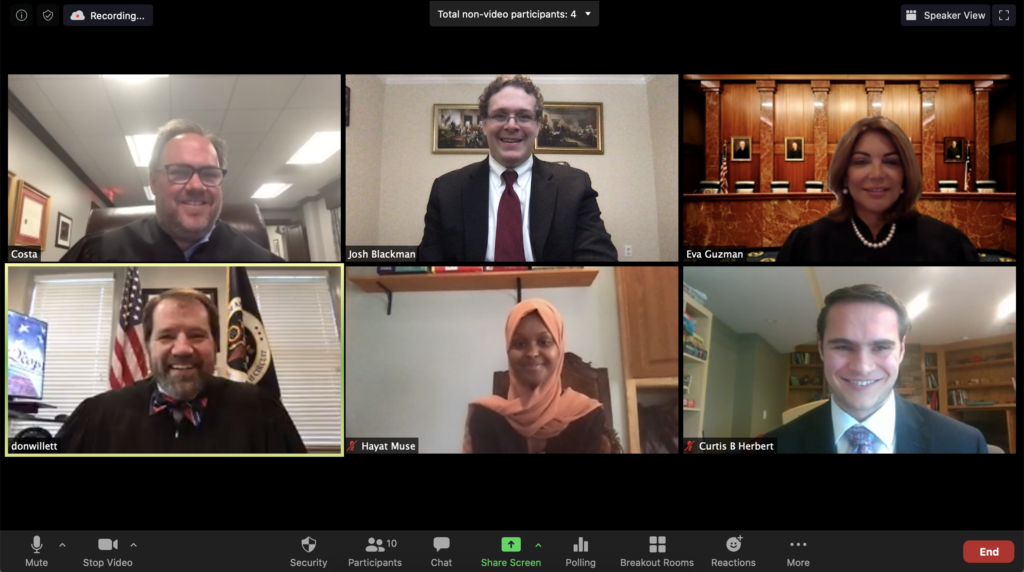
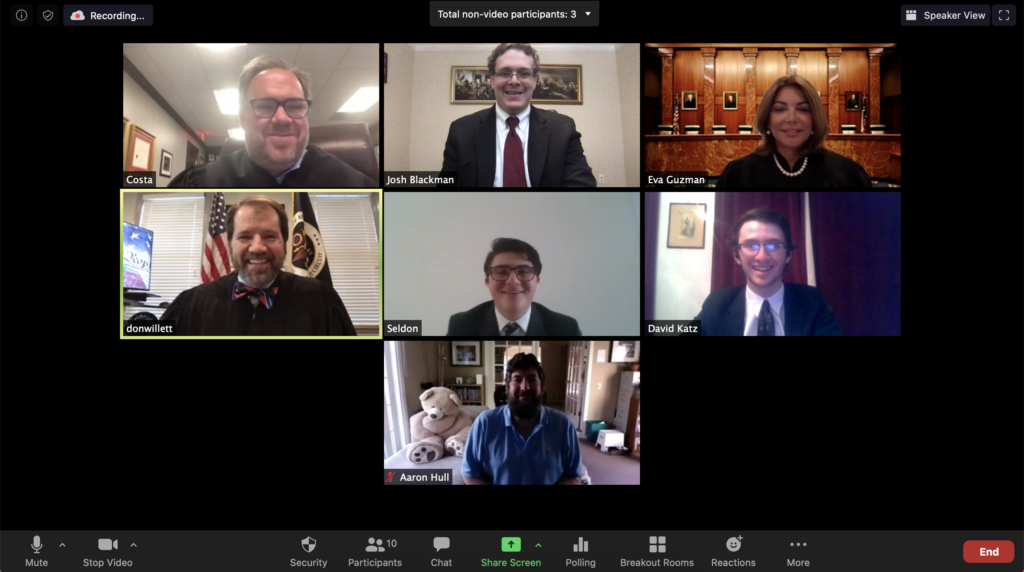
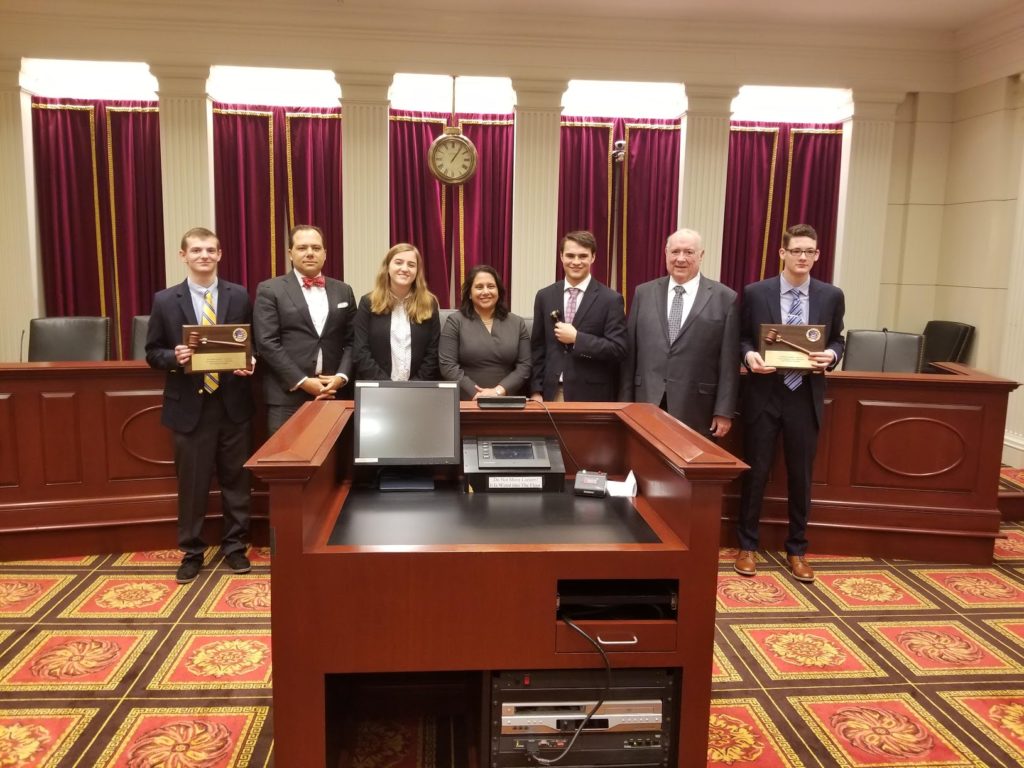 Curtis Herbert, a junior at Spring Lake Park Lighthouse School in Minnesota, and Anna Salvatore, a junior at Hopewell Central Valley High School in New Jersey, argued on behalf of the petitioners. Salvatore, the founder of the popular blog, High School SCOTUS, stepped in to participate in the championship round for Herbert’s classmate and partner Sana Wazwaz. You can download their brief here. Declan Davis and William Foster, juniors from Walter Payton College Preparatory High School in Illinois, argued on behalf of the respondents. You can download their brief here.
Salvatore, Herbert, and Foster all write for the High School SCOTUS blog. We encourage you to check out the blog. You’ll be amazed and inspired by the sophisticated Supreme Court analysis produced by these talented high school students.
To reach the championship round, these outstanding students had to compete against dozens of teams from all corners of the continental United States. Our top two teams not only submitted the best-written appellate briefs, but also proved to be the most able oral advocates in the preliminary oral argument rounds.
Their skills were put to the test during the championship round where, during oral argument in front of a lively panel of judges, the students had to respond to rapid fire and complex legal questions. The competition was judged by Honorable Neomi Rao, United States Court of Appeals for the District of Columbia Circuit, the Honorable Royce Lamberth, United States District Court for the District of Columbia, and Mr. Ilya Shapiro, director of the Robert A. Levy Center for Constitutional Studies at the Cato Institute.
The competition was fierce, but Davis and Foster prevailed in the end, and were named the champions of the 2018-19 Virtual Supreme Court Competition. Herbert and Salvatore placed second in the overall competition.
Judge Lambert, who has judged the Virtual Supreme Court Competition for several years, shared after this year’s competition:
Curtis Herbert, a junior at Spring Lake Park Lighthouse School in Minnesota, and Anna Salvatore, a junior at Hopewell Central Valley High School in New Jersey, argued on behalf of the petitioners. Salvatore, the founder of the popular blog, High School SCOTUS, stepped in to participate in the championship round for Herbert’s classmate and partner Sana Wazwaz. You can download their brief here. Declan Davis and William Foster, juniors from Walter Payton College Preparatory High School in Illinois, argued on behalf of the respondents. You can download their brief here.
Salvatore, Herbert, and Foster all write for the High School SCOTUS blog. We encourage you to check out the blog. You’ll be amazed and inspired by the sophisticated Supreme Court analysis produced by these talented high school students.
To reach the championship round, these outstanding students had to compete against dozens of teams from all corners of the continental United States. Our top two teams not only submitted the best-written appellate briefs, but also proved to be the most able oral advocates in the preliminary oral argument rounds.
Their skills were put to the test during the championship round where, during oral argument in front of a lively panel of judges, the students had to respond to rapid fire and complex legal questions. The competition was judged by Honorable Neomi Rao, United States Court of Appeals for the District of Columbia Circuit, the Honorable Royce Lamberth, United States District Court for the District of Columbia, and Mr. Ilya Shapiro, director of the Robert A. Levy Center for Constitutional Studies at the Cato Institute.
The competition was fierce, but Davis and Foster prevailed in the end, and were named the champions of the 2018-19 Virtual Supreme Court Competition. Herbert and Salvatore placed second in the overall competition.
Judge Lambert, who has judged the Virtual Supreme Court Competition for several years, shared after this year’s competition:
“I have found that this competition gets better each year, and this year was the best yet. Both teams were superb advocates, and it was hard to believe that these were not law students they were so outstanding. Our future is in good hands if this is what we have to look forward to. I would love to have attorneys appear before me every day who are as bright, well prepared, articulate, and knowledgeable as these four.”Ilya Shapiro said of the students, “[they] were extremely well prepared and displayed poise far beyond their years. And it’s exciting to see them so passionate about the Constitution. They might as well skip senior year (and college) and go straight to law school.”
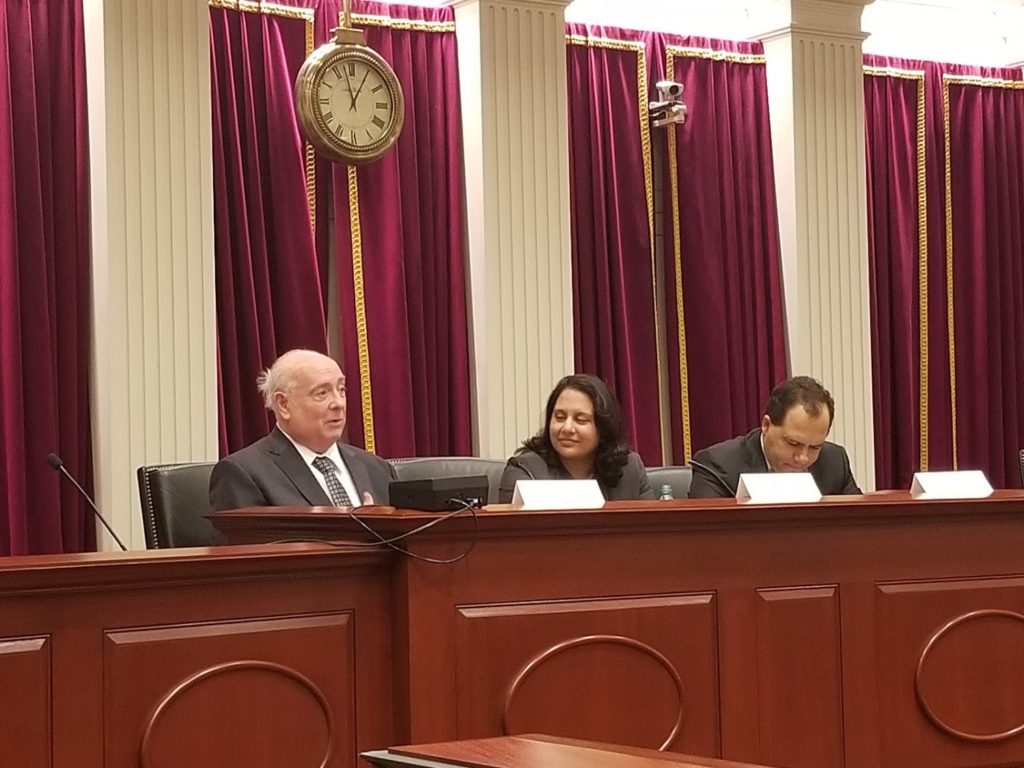 Of their experience with the competition, the students said –
Of their experience with the competition, the students said –
"I didn't know before this that there was an entire community of high schoolers who were as passionate about the law as I was. This organization has introduced me to a network of people across several states that I feel I might be able to draw upon for advice in college, law school, and beyond." – Declan Davis
"To work with Declan on the brief and preliminary arguments, and finally to argue in front of federal judges, was a terrific experience, one which I will remember for a long time to come. I am thankful to the Harlan Institute and ConSource for sponsoring this amazing competition." – William Foster
"The experience was a wonderful chance to delve into complex legal questions and hone my skills." – Curtis Herbert
Julie Silverbrook, Executive Director of ConSource, said of the student competitors: “These students represent the very best of America. They are a testament to what can be achieved when thought leaders, public officials, schools, teachers, and parents invest in the civic education of our young people! The sky is the limit for these talented high school students.” Harlan Institute President Josh Blackman, shared: “I am so proud of all the students that participated in our competition this year. They give me hope for the future of our constitutional order."“It was surreal to learn the ins and outs of a real case and argue before federal judges. I highly recommend this competition for other high school students who are considering a career in law.” – Anna Salvatore
